Korea National Railroad College was a national university located in Uiwang, South Korea. In 2012 it merged with Chungju National University to form the Korea National University of Transportation.
Korea National Railroad College was a national university located in Uiwang, South Korea. In 2012 it merged with Chungju National University to form the Korea National University of Transportation.
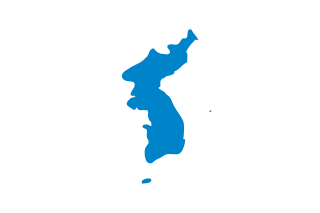
Korea is a peninsular region in East Asia consisting of the Korean Peninsula, Jeju Island, and smaller islands. Since the end of World War II in 1945, it has been politically divided at or near the 38th parallel; in 1948, two states declared independence, both claiming sovereignty over the entire region: North Korea in its northern half and South Korea in the south, which fought the Korean War from 1950 to 1953. The region is bordered by China to the north and Russia to the northeast, across the Amnok (Yalu) and Duman (Tumen) rivers, and is separated from Japan to the southeast by the Korea Strait.

Korean is the native language for about 81 million people, mostly of Korean descent. It is the national language of both North Korea and South Korea.

The Korean War was an armed conflict on the Korean Peninsula fought between North Korea and South Korea and their allies. North Korea was supported by the People's Republic of China and the Soviet Union, while South Korea was supported by the United Nations Command (UNC) led by the United States. Fighting ended in 1953 with an armistice, with no treaty signed.

North Korea, officially the Democratic People's Republic of Korea (DPRK), is a country in East Asia. It constitutes the northern half of the Korean Peninsula and borders China and Russia to the north at the Yalu (Amnok) and Tumen rivers, and South Korea to the south at the Korean Demilitarized Zone. The country's western border is formed by the Yellow Sea, while its eastern border is defined by the Sea of Japan. North Korea, like its southern counterpart, claims to be the sole legitimate government of the entire peninsula and adjacent islands. Pyongyang is the capital and largest city.

South Korea, officially the Republic of Korea (ROK), is a country in East Asia. It constitutes the southern part of the Korean Peninsula and borders North Korea along the Korean Demilitarized Zone; though it also claims the land border with China and Russia. The country's western border is formed by the Yellow Sea, while its eastern border is defined by the Sea of Japan. South Korea claims to be the sole legitimate government of the entire peninsula and adjacent islands. It has a population of 51.96 million, of which half live in the Seoul Capital Area, the ninth most populous metropolitan area in the world. Other major cities include Busan, Daegu, and Incheon.
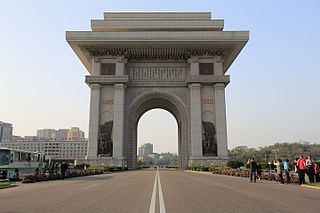
Pyongyang is the capital and largest city of North Korea, where it is sometimes labeled as the "Capital of the Revolution". Pyongyang is located on the Taedong River about 109 km (68 mi) upstream from its mouth on the Yellow Sea. According to the 2008 population census, it has a population of 3,255,288. Pyongyang is a directly administered city with a status equal to that of the North Korean provinces.

Busan, officially Busan Metropolitan City, is South Korea's second most populous city after Seoul, with a population of over 3.3 million inhabitants as of 2024. Formerly romanized as Pusan, it is the economic, cultural and educational center of southeastern South Korea, with its port being South Korea's busiest and the sixth-busiest in the world. The surrounding "Southeastern Maritime Industrial Region" is South Korea's largest industrial area. The large volumes of port traffic and urban population in excess of 1 million make Busan a Large-Port metropolis using the Southampton System of Port-City classification. As of 2019, Busan Port is the primary port in Korea and the world's sixth-largest container port.

Seoul National University is a public research university located in Seoul, South Korea. It is one of the SKY universities and a part of the Flagship Korean National Universities.
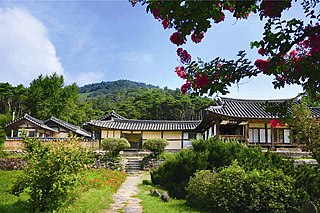
South Chungcheong Province, also known as Chungnam, is a province of South Korea in the Hoseo region in the southwest of the Korean Peninsula. South Chungcheong borders the provinces of Gyeonggi to the north, North Chungcheong, Sejong Special Self-governing City, and Daejeon Metropolitan City to the east, and North Jeolla to the south.
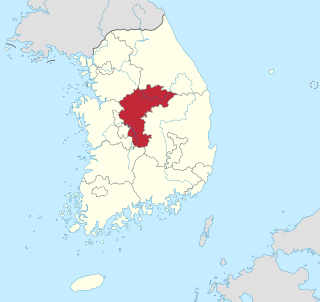
North Chungcheong Province, also known as Chungbuk, is a province of South Korea. North Chungcheong has a population of 1,578,934 (2014) and has a geographic area of 7,433 km2 (2,870 sq mi) located in the Hoseo region in the south-center of the Korean Peninsula. North Chungcheong borders the provinces of Gyeonggi and Gangwon to the north, North Gyeongsang to the east, North Jeolla to the south and South Chungcheong, Sejong Special Autonomous City and Daejeon Metropolitan City to the west.

Gyeonggi Province is the most populous province in South Korea.
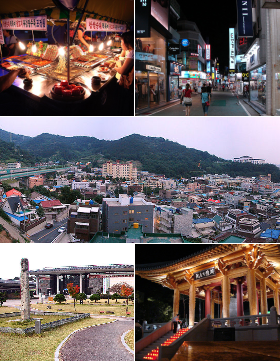
Gwangju, formerly romanized as Kwangju, is South Korea's sixth-largest metropolis. It is a designated metropolitan city under the direct control of the central government's Home Minister. The city was also the capital of South Jeolla Province Province until the provincial office moved to the southern village of Namak in Muan County in 2005 because Gwangju was promoted to a metropolitan city and was independent of South Jeolla Province.

Daegu, formerly spelled Taegu and officially Daegu Metropolitan City (대구광역시), is a city in southeastern South Korea.

The division of Koreade facto began on 2 September 1945, when Japan signed the surrender document, thus ending the Pacific Theater of World War II. It was officially divived with the establishment of the two Koreas in 1948. During World War II, the Allied leaders had already been considering the question of Korea's future following Japan's eventual surrender in the war. The leaders reached an understanding that Korea would be liberated from Japan but would be placed under an international trusteeship until the Koreans would be deemed ready for self-rule. In the last days of the war, the United States proposed dividing the Korean peninsula into two occupation zones with the 38th parallel as the dividing line. The Soviets accepted their proposal and agreed to divide Korea.

Education in South Korea is provided by both public schools and private schools. Both types of schools receive funding from the government, although the amount that the private schools receive is less than the amount of the state schools.

Korea University is a private university in Seoul, South Korea. Established in 1905, the university was named after Goguryeo. The university is one of the SKY universities.
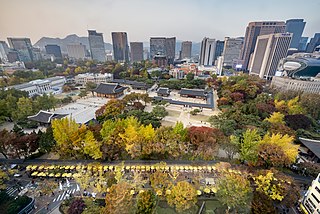
Seoul, officially Seoul Special Metropolitan City, is the capital and largest city of South Korea. The broader Seoul Capital Area, encompassing Gyeonggi Province and Incheon, emerged as the world's sixth largest metropolitan economy in 2022, trailing behind Paris, San Francisco, Los Angeles, Tokyo, and New York, and hosts more than half of South Korea's population. Although Seoul's population peaked at slightly over 10 million, it has gradually decreased since 2014, standing at approximately 9.97 million residents as of 2020. Seoul is the seat of the South Korean government.

Kim Il Sung was a North Korean politician, revolutionary, and military leader. He founded the Democratic People's Republic of Korea, commonly known as North Korea, which he led as Supreme Leader from its establishment in 1948 until his death in 1994. Afterwards, he was succeeded by his son Kim Jong Il and was declared Eternal President.

The Korean alphabet, known as Hangul or Hangeul in South Korea and Chosŏn'gŭl in North Korea, is the modern writing system for the Korean language. The letters for the five basic consonants reflect the shape of the speech organs used to pronounce them. They are systematically modified to indicate phonetic features. The vowel letters are systematically modified for related sounds, making Hangul a featural writing system. It has been described as a syllabic alphabet as it combines the features of alphabetic and syllabic writing systems.